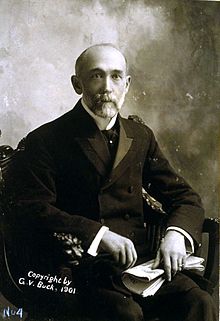Thomas Collier Platt
| Thomas C. Platt | |
|---|---|
 |
|
| Member of the U.S. House of Representatives from New York's 27th district |
|
|
In office March 4, 1873 – March 3, 1875 |
|
| Preceded by | Horace B. Smith |
| Succeeded by | Elbridge G. Lapham |
| Member of the U.S. House of Representatives from New York's 28th district |
|
|
In office March 4, 1875 – March 3, 1877 |
|
| Preceded by | Horace B. Smith |
| Succeeded by | Jeremiah W. Dwight |
|
United States Senator from New York |
|
|
In office March 4, 1881 – May 16, 1881 |
|
| Preceded by | Francis Kernan |
| Succeeded by | Warner Miller |
|
United States Senator from New York |
|
|
In office March 4, 1897 – March 3, 1909 |
|
| Preceded by | David B. Hill |
| Succeeded by | Elihu Root |
| Personal details | |
| Born |
Thomas Collier Platt July 15, 1833 Owego, New York |
| Died | March 6, 1910 (aged 76) New York City, New York |
| Political party | Republican |
Thomas Collier Platt (July 15, 1833 – March 6, 1910) was a two-term member of the U.S. House of Representatives (1873–1877) and a three-term U.S. Senator from New York in the years 1881, 1897 to 1909—is best known as the "political boss" of the Republican Party in New York State in the late 19th century and early 20th century. Upon his death, the New York Times stated that "no man ever exercised less influence in the Senate or the House of Representatives than he," but "no man ever exercised more power as a political leader." He considered himself the "political godfather" of many Republican governors of the state, including Theodore Roosevelt.
Platt played a key role in the creation of the City of Greater New York, which incorporated together the boroughs of New York (Manhattan), Kings (Brooklyn), Queens, Richmond (Staten Island) and Bronx counties.
Platt was born to William Platt, a lawyer, and Lesbia Hinchman, in Owego, New York on July 15, 1833. State Senator Nehemiah Platt (1797–1851) was William Platt's brother.
William Platt, a successful attorney and strict Presbyterian, encouraged his son to enter the ministry. Accordingly, the young Platt was prepared for college at the Owego Academy and attended Yale College (1850–1852), where he studied theology, but failed to earn a degree. After leaving Yale in 1852, he entered into a variety of employments. He started out as a druggist (a business in which he was engaged for two decades), was briefly an editor of a small newspaper, served as President of the Tioga National Bank, and was interested in the lumbering business in Michigan. He also acted as President of the Southern Central and other railways.
In 1852, he married Ellen Lucy Barstow, with whom he had three sons: Edward T. Platt, Frank H. Platt, and Henry B. Platt.
Platt became Secretary and a director of the United States Express Co. in 1879 and was elected President of the company in 1880. He was a member and President of the Board of Quarantine Commissioners of New York from 1880 to 1888. He was President of the Tennessee Coal & Iron Company for several years.
...
Wikipedia
